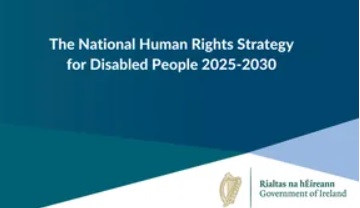The new National Human Rights Strategy for Disabled People 2025-2030 has been launched by the Department of Children, Disability and Equality. This replaces the Strategy that ended in 2022.
The Vision of the Strategy is “To ensure full participation in Irish society on an equal basis with others, disabled people have a right to a life without barriers.” The values that underpin the Strategy are equality, participation and choice. The principles of the Strategy align with the principles of the United Nations Convention on the Rights of Persons with Disabilities.
The implementation of the Strategy is supplemented by a “Programme of Action” to be created every two years; the first programme is set to be published in 3 months after the publication of the Strategy.
There remains a significant employment gap for disabled people in Ireland, which is one of the largest in the EU. The employment participation rate for disabled people of working age is 49%, compared to 71% for the wider working population. This shows there is many barriers to accessing employment, and that disabled people face multiple disadvantages in accessing opportunities. This also results in a disproportionate rate of consistent poverty, in comparison with the general population.
Employment is one of the five key pillars in the Strategy.
There are three key commitments under this Pillar.
The commitments are:
1. Civil and Public Sector
“We will maximise opportunities and access for disabled people to get meaningful work in the civil and public sector.”
- This includes a minimum target of 6% statutory employment for disabled people across the civil and public sector.
2. Private Sector
“We will actively promote the hiring and career advancement of disabled people across the private sector.”
- This includes improving employer take-up of disability supports, expansion of disability employment programmes, and a ministerial-lead forum to discuss issues related to the employment of disabled people.
3. Supporting Disabled People to Work
“We will provide the right supports at the right time for disabled people to access work or return to work.”
This commitment is of significant interest, with several actions including:
- Review the provision of disability equality training provided to Intreo staff.
- Reform the Disability Allowance Payment and remove anomalies in the means test.
- Double the number of disability employment advisors operating in Intreo, and a target of 300 employers signed up to the “Employer Charter” by the end of 2025.
- “Examine ways, in consultation with disabled people, to make it easier to regain Disability Allowance if employment ceases. We will expand the “no questions asked” route of return to disability payments to 3 years.
- Review the retention of secondary benefits when taking up employment.
- Promote the Disability Day Services Deferrals Policy to allow flexibility to take up education, employment and other mainstream opportunities.
- Ensure rehabilitative training supports the development of skills required to explore further education and training opportunities.
The INOU looks forward to seeing the first Programme of Action to see the intended actions to be taken over the first two years of the Strategy. We hope progress will be made swiftly to close the wide employment gap for disabled people in Ireland.
